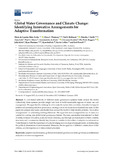Global Water Governance and Climate Change: Identifying Innovative Arrangements for Adaptive Transformation
Metadata
Show full item recordAuthor
Melo Zurita, Maria de Lourdes
Thomsen, Dana C.
Holbrook, Neil J.
Smith, Timothy F.
Lyth, Anna
Munro, Paul G.
de Bruin, Annemarieke
Seddaiu, Giovanna
Roggero, Pier Paolo
Baird, Julia
Plummer, Ryan
Bullock, Ryan
Collins, Kevin
Powell, Neil
Date
2018Citation
Melo Zurita, Maria de Lourdes, Dana C. Thomsen, Neil J. Holbrook, Timothy F. Smith, Anna Lyth, Paul G. Munro, Annemarieke de Bruin, Giovanna Seddaiu, Pier Paolo Roggero, Julia Baird, Ryan Plummer, Ryan Bullock, Kevin Collins, and Neil Powell. "Global water governance and climate change: Identifying innovative arrangements for adaptive transformation. Water." 10(1) (2018): 29. DOI: 10.3390/w10010029.
Abstract
A convoluted network of different water governance systems exists around the world.
Collectively, these systems provide insight into how to build sustainable regimes of water use and management. We argue that the challenge is not tomake the systemless convoluted, but rather to support positive and promising trends in governance, creating a vision for future environmental outcomes. In this paper, we analyse nine water case studies from around the world to help identify potential ‘innovative arrangements’ for addressing existing dilemmas. We argue that such arrangements can be used as a
catalyst for crafting new global water governance futures. The nine case studies were selected for their diversity in terms of location, scale and water dilemma, and through an examination of their contexts, structures and processes we identify key themes to consider in the milieu of adaptive transformation.
These themes include the importance of acknowledging socio-ecological entanglements, understanding
the political dimensions of environmental dilemmas, the recognition of different constructions of the
dillema, and the importance of democratized processes.

